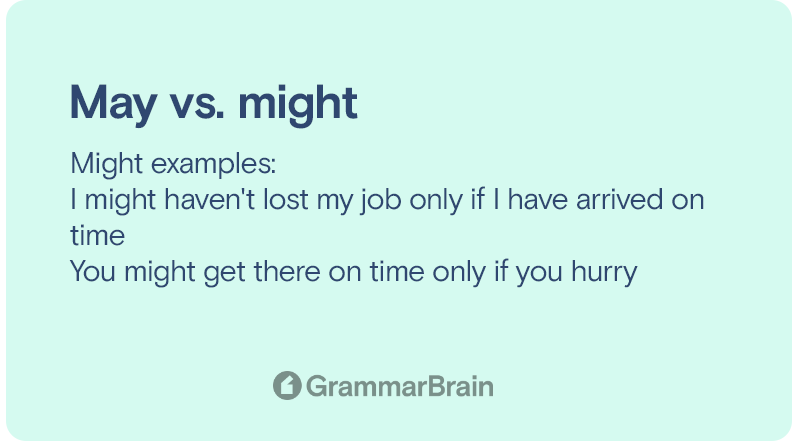May Vs Might Grammarly

May Vs Might Download Free Pdf Grammatical Tense Perfect Grammar Learn the difference between the words may and might and how to use each of them correctly in a sentence so your writing always looks polished. Use may for present tense, and might for past perfect tense. may expresses a high possibility of something happening, whereas might hints that it might not happen.

May Vs Might 03 Although the difference is slight, determining the probability of an occurrence can determine whether you choose to use “may” or “might.” use “may” if there is a high probability that something is going to happen. for example: is there a high probability that you will go for drinks after work?. May is used to express what is possible, factual, or could be factual. for example, he may lose his job. we may go on vacation. i may have dessert after dinner. might is used to express what is hypothetical, counterfactual, or remotely possible. for example, if you hurry, you might get there on time. Learn about the differences between may and might. find out if these two words can be used interchangeably and when they are appropriate to use. And there you have it — a comprehensive guide to may versus might. remember, the key is in the nuance: may carries a sense of probability or permission, often more formal or certain, while might introduces a shade of doubt or lesser likelihood.

May Vs Might Which To Use Grammar Examples Grammarbrain Learn about the differences between may and might. find out if these two words can be used interchangeably and when they are appropriate to use. And there you have it — a comprehensive guide to may versus might. remember, the key is in the nuance: may carries a sense of probability or permission, often more formal or certain, while might introduces a shade of doubt or lesser likelihood. While they’re sometimes interchangeable in casual contexts, “may” sounds more likely and formal, while “might” expresses uncertainty or refers to past possibilities. May is used for higher probability possibilities, granting permission, or expressing wishes. might is used for lower probability possibilities, suggesting less certainty. Choose "may" if you're asking for permission or indicating a real possibility based on present circumstances. choose "might" when you're suggesting a lower probability, discussing hypothetical scenarios, or future uncertainty. May and might are helping verbs that are often used interchangeably to express possibility or to ask permission. might can be used as the past tense of may, as in he might have been world champion if he hadn’t gotten injured.
Comments are closed.